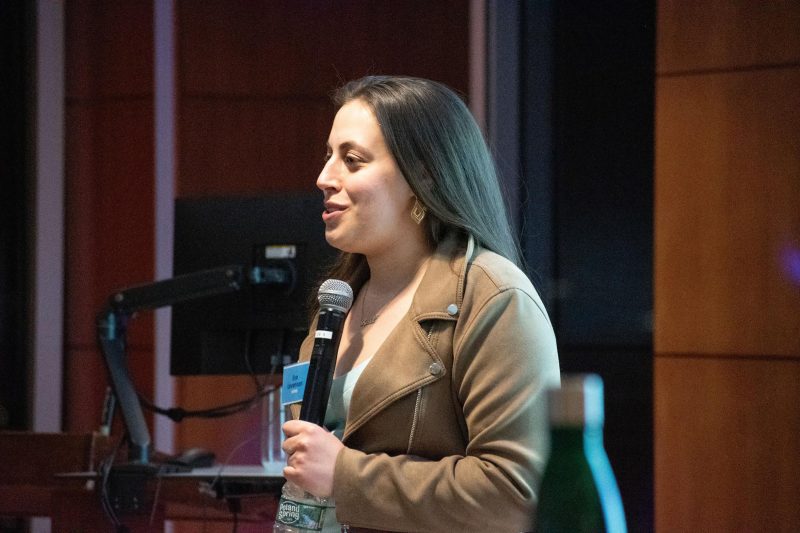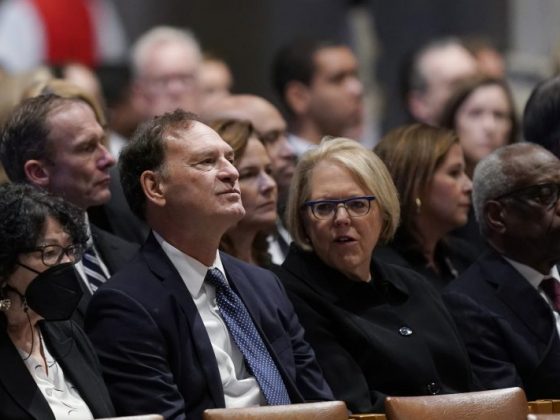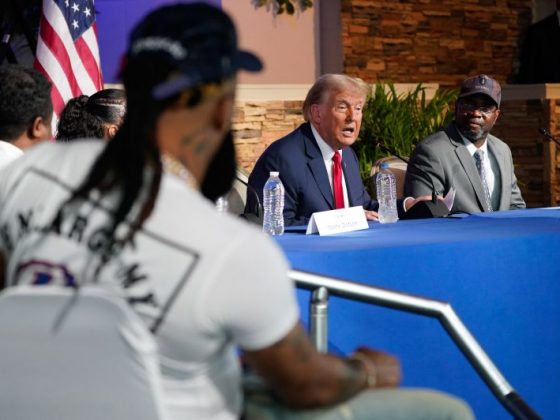This spring, 24-year-old Eve Levenson returned to her alma mater, George Washington University, as the national youth engagement director for President Biden’s campaign. She was uncertain how she would be received.
Levenson was worried that protesters might interrupt the political networking event she was keynoting, according to the then–president of the GW College Democrats. Anytime she visits a campus, Levenson acknowledged in an interview, she anticipates encountering people with a range of views. She played it safe in her remarks, avoiding polarizing topics such as Biden’s age and the Israel-Gaza war and focusing on her youth organizing experience.
“She’s in a very difficult position right now,” said Sarah Freeman, who served as president of the GW College Democrats and organized the visit. “It’s hard to engage the youth vote both with what’s going on in the Middle East … and also just the fact that [Biden] is so far away in age from everybody in college.”
Levenson has what might be one of the hardest jobs on Biden’s reelection campaign, charged with persuading young Americans, many of whom are deeply skeptical of Biden, to vote for him in November. A political activist since high school, when she first met now-Biden campaign manager Julie Chavez Rodriguez, Levenson has a job that requires helping equip students to counter criticism of the president and training volunteer leaders and organizers to talk to voters not yet sold on voting for him.
Throughout Biden’s term, many young voters have voiced frustration over stalled campaign promises such as cancellation of student loan debt and a pathway to citizenship for undocumented immigrants. In recent months, widespread campus protests broke out over the president’s support for Israel despite high civilian casualties from its ongoing military campaign in Gaza.
Although inflation, housing and health care are bigger priorities for young voters, polling shows, the war looms large on the college campuses Levenson spent the spring visiting. Some young Biden supporters — including national leadership of the College Democrats of America, a group whose endorsement the campaign has touted — have raised concerns about the president’s handling of the conflict.
“Each day that Democrats fail to stand united for a permanent ceasefire, two-state solution, and recognition of a Palestinian state, more and more youth find themselves disillusioned with the party,” read a statement in late April from the group, one of 15 young-voter-focused organizations that endorsed Biden’s campaign in March.
Levenson joined the Biden team in January, earlier in the election cycle than Democratic presidential candidates usually hire for her role, and is one of the youngest people to ever hold her title. She has spent the past few months traversing the country, meeting with young voters and organizers and training students to use an app that allows users to send pro-Biden content to share on social media, gather contacts for the campaign and make a voting plan.
So far, Levenson has mostly appeared before friendly audiences of Democratic students and leaders already planning to support Biden, highlighting policy areas in which Biden earns high marks from young voters, such as climate change and reproductive health. The campaign declined to accommodate The Washington Post’s requests to see her work in person, citing scheduling conflicts, but made her available by phone.
Student organizers who met with Levenson this spring praised her and the campaign’s efforts, but said she faces an enormous challenge.
This spring at the Michigan College Democrats convention, where she helped coach attendees through starting Students for Biden chapters on their campuses, Levenson told student leaders that Biden can be pushed to the left, according to Alec Hughes, president of College Democrats at the University of Michigan, who attended the meeting.
Levenson, he recalled, urged organizers to remember that “either it’s him or [Donald] Trump — who obviously cannot be pushed to the left, cannot be pushed to compromise at all.”
In organizing trainings, Levenson encourages volunteers to use an “empathetic bridge” to speak with potential voters who may disagree with some of Biden’s policies — as she put it, “giving people the space and permission … that it is okay to be with us, even if maybe you don’t agree 100 percent with every single policy.”
“When we talk about reaching young people where they are, it’s not only about reaching young people physically where they are on campus and online. It’s also about reaching them where they are in terms of how they’re feeling about the election, and how they’re feeling about Biden in this moment,” Levenson said.
Some outside organizing groups are optimistic that the time Levenson spent working at organizations such as the student-led March for Our Lives will help Democrats better coordinate with allies who share the party’s goals, said Santiago Mayer, founder of the Gen Z-focused Voters of Tomorrow.
With Levenson, there is more focus on being “additive rather than duplicative,” he said.
Her efforts could prove critical for Biden, as enthusiasm among young voters has waned significantly since four years ago. Though voters ages 18 to 29 were key to Biden’s victory in 2020, backing him over Trump by a 25-point margin, Biden now holds only an 11-point lead in the age group in an average of four polls since April.
In a recent Harvard Youth Poll, a large majority of young Americans disapproved of Biden’s handling of the Israel-Hamas war, 76 percent to 18 percent. But the same poll found young people ranked “Israel/Palestine” 15th out of 16 areas of concern.
Levenson said young people most often talk to her about areas where “there’s an especially clear contrast between Biden and our opponent,” such as curbing gun violence, reproductive health care and the cost of living.
To persuade young people to vote for Biden, “it is important sometimes to make clear how much worse would Trump be,” she said.
Trump has sought to cast himself as a better president for young voters and claimed young people are doing worse under the Biden administration, citing inflation, unemployment levels and declines in homeownership among young people.
The Biden campaign is expanding the ranks of personnel focused on young voters, and Levenson does not have a counterpart in the Trump campaign, interviews with strategists on both sides show.
Still, some of Biden’s allies in the College Democrats remain unconvinced that his campaign is doing enough to win over skeptical voters.
Sohali Vaddula, communications director for the group, said “they are doing a lot more [young voter outreach] than we’ve ever seen in the past,” but she fears the campaign does not understand “the gravitas of the situation” of young voters’ frustration over Gaza.
“This whole conflict has overshadowed a lot of great things he’s done,” said Vaddula, who will be supporting Biden in November but described difficulties persuading her peers to do the same.
She said some of her classmates told her they can’t think about reproductive rights “when there’s a genocide going on,” while others don’t see a difference between Biden and Trump and don’t plan to vote at all.
The Biden campaign is focused on reaching young voters in three categories: on campus, online and non-students, according to Levenson.
At the heart of its campus organizing is Students for Biden Harris, an organizing program launched in March with chapters at more than 270 campuses in 38 states and D.C.
Over the summer, Levenson and her colleagues plan to focus more on non-students, turning to places young people gather such as bars, sporting events and music festivals like Dreamville Fest in North Carolina, where the campaign canvassed this spring. Online, the campaign is working with influencers and buying digital ads on social media sites such as Snapchat, where it is the top spender of any political campaign.
The Trump campaign, meanwhile, sees “significant openings among younger consumers,” focusing on opportunities for viral moments, according to an outside consultant for the campaign, who spoke on the condition of anonymity to talk more openly about the campaign’s plans. Last fall, for example, Trump stopped by an Iowa State University fraternity house to flip burgers and throw autographed footballs.
To motivate voters who don’t see a difference between the two candidates, Levenson said she would lean on her personal experience in gun violence prevention and initiatives such as the Affordable Care Act, which Biden has championed.
“What would the negative with Trump look like?” she added.
Emily Guskin contributed to this report.


